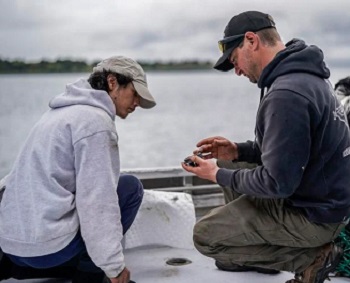 Lane Bolich first came to work in Alaska for the freedom and excitement that comes with being a fisher. A self-described adrenaline junkie, Bolich moved from his hometown in rural Washington state because he loves being on the ocean even in cold winter weather and it gave him the chance to make more money than back home. After working as a deckhand for two years on a family friend’s boat, Harmony, he took the wheel as captain this year at just 20 years old. Bolich is a rarity in an aging industry with high barriers to entry, equipment and access rights are costly, and increasing unpredictability as human-caused climate change alters marine habitats. As some fish populations dwindle and fewer people pursue the trade, fishers and conservation groups are actively working to bring in and retain the next generation of fishers through grants and training even as the industry continues to shrink in Alaska. 19 photos, >>click to read<< 09:38
Lane Bolich first came to work in Alaska for the freedom and excitement that comes with being a fisher. A self-described adrenaline junkie, Bolich moved from his hometown in rural Washington state because he loves being on the ocean even in cold winter weather and it gave him the chance to make more money than back home. After working as a deckhand for two years on a family friend’s boat, Harmony, he took the wheel as captain this year at just 20 years old. Bolich is a rarity in an aging industry with high barriers to entry, equipment and access rights are costly, and increasing unpredictability as human-caused climate change alters marine habitats. As some fish populations dwindle and fewer people pursue the trade, fishers and conservation groups are actively working to bring in and retain the next generation of fishers through grants and training even as the industry continues to shrink in Alaska. 19 photos, >>click to read<< 09:38
Tag Archives: commercial fishing
Mr Fisher: Taking viewers on a real time ride on a fishing vessel
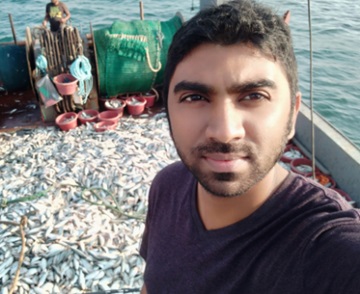 Md Jahidur Rahman, a fishing boat skipper, has been sharing videos of fishing operations in the Bay of Bengal for some time now, and one can watch the everyday life of our sea-going fishers aboard the trawlers, as well as many other tiny details of thsharing videose business. While wooden fishing boats are common along the coastline of the country, industrial fishing vessels fitted with modern equipment are only seen in the Chattogram area. As a result, the videos of the boats operating in the sea have drawn the attention of viewers. Jahid says it is the main goal of his vlogging. “The goal of the videos is to let people know about our marine fishing industry: how we use the latest fishing equipment on modern fishing vessels, which people have only seen on television,” said Jahid. photos, >>click to read<< 12:44
Md Jahidur Rahman, a fishing boat skipper, has been sharing videos of fishing operations in the Bay of Bengal for some time now, and one can watch the everyday life of our sea-going fishers aboard the trawlers, as well as many other tiny details of thsharing videose business. While wooden fishing boats are common along the coastline of the country, industrial fishing vessels fitted with modern equipment are only seen in the Chattogram area. As a result, the videos of the boats operating in the sea have drawn the attention of viewers. Jahid says it is the main goal of his vlogging. “The goal of the videos is to let people know about our marine fishing industry: how we use the latest fishing equipment on modern fishing vessels, which people have only seen on television,” said Jahid. photos, >>click to read<< 12:44
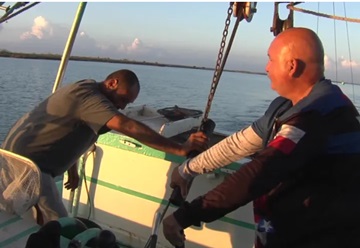
Texas: Bay Shrimpers
Just about every day of the week you can find Vito Sandoval and Ricardo Rodriguez plying the waters of the Brownsville ship channel dragging their net to provide local bait stands with live shrimp. With the sun just clearing the horizon, they are on the water and getting ready to haul in their first drag of the day. They are an efficient team and while Rodriguez expertly separates the shrimp from “bycatch,” Sandoval returns to the Captain’s chair, where he is right at home as bay shrimping is a family tradition. “My dad did it for many, many years. He is the one that got me going around 12 years old that’s when I started coming with him on the weekends and the summertime, and I loved it,” said Vito Sandoval. Video, photos, >>click to read<< 09:06
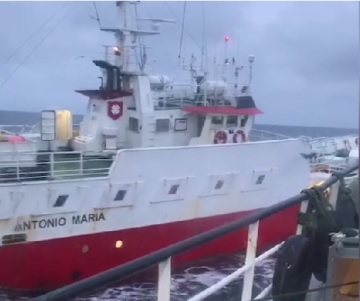
Shetland trawler hits out at ‘dangerous’ encounter
A Shetland based trawler crew have hit out at the “dangerous” behaviour of a French boat which they claim tried to entangle their propeller with a rope. The crew of Lerwick-based Defiant videoed the encounter with the Antonio Maria, 18 miles off Shetland, just outside UK territorial waters. Fishermen are now calling for tougher action and powers for the authorities to prevent lives being put at risk. The owners of the French vessel have been approached for comment. Defiant’s skipper, Magnus Polson, said he was in disbelief during the incident. >>click to read<< 11:30
David and Ellen Goethel talk with Roger Wood About Their Favorite Subjects
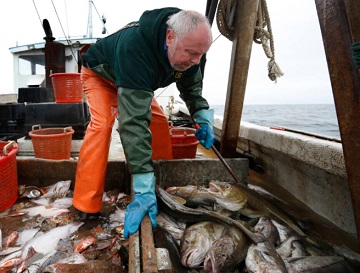 David Goethel of Hampton may have retired from commercial fishing, but he’s still on the water on a regular basis. Ellen Goethel, his wife and partner can’t stop teaching about and researching the ocean and its creatures. Together they form a formidable duo in life and in science. David survived a bout with cancer, and while recovering wrote a book. Endangered Species is about his life on the water, his favorite place. But it’s also about the losing battle that those who still go down to the sea in ships have been facing when the rules go against them at a time when scientists are declaring that overfishing has put the species at risk, especially in the productive Gulf of Maine. In this podcast, Roger Wood speaks to both of them, learning about David’s newly published book and their shared passion, the sea. >>click to read/listen<< 08:17
David Goethel of Hampton may have retired from commercial fishing, but he’s still on the water on a regular basis. Ellen Goethel, his wife and partner can’t stop teaching about and researching the ocean and its creatures. Together they form a formidable duo in life and in science. David survived a bout with cancer, and while recovering wrote a book. Endangered Species is about his life on the water, his favorite place. But it’s also about the losing battle that those who still go down to the sea in ships have been facing when the rules go against them at a time when scientists are declaring that overfishing has put the species at risk, especially in the productive Gulf of Maine. In this podcast, Roger Wood speaks to both of them, learning about David’s newly published book and their shared passion, the sea. >>click to read/listen<< 08:17
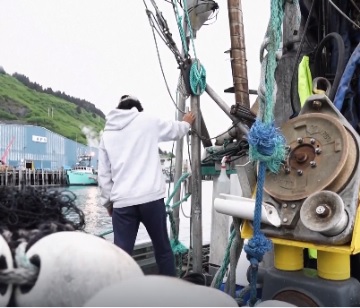
In a surging seafood industry, boat captains struggle to find workers
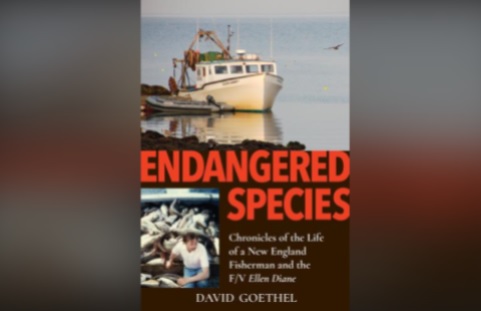
A fisherman’s view of the state of commercial fishing
If the control cord for the hoist at the Hampton State Pier had been the correct length and David Goethel had not lost his balance in reaching for it and had not fallen head-first to the floating dock 20 feet below, we may have never had the chance to read “Endangered Species,” just out from Peter Randall Publishing. That would be a shame. Goethel’s memoir of his life as a commercial fisherman on the Atlantic Ocean is by turns funny, scary, and educational. You may wince as he tells of the rough times and seas that fishermen sometimes face, where a high wave can cause a sharp knife to be impaled in one’s leg. It happened to Goethel, whose oldest son, Eric, had to use the Boy Scout life-saving skills he had just learned to help stop the bleeding. You may feel as frustrated as does Goethel when federal government and non-governmental actors force rules and regulations that make no sense and where the bureaucrats are dismissive of the fishermen who — spoiler alert — actually do know something about fishing and fish. >>click to read<< 08:07
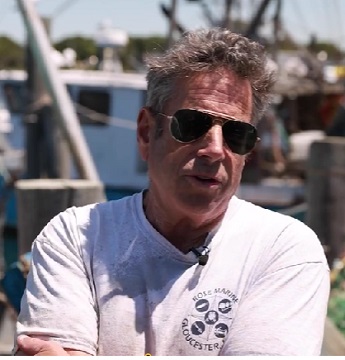
Wind energy expansion raises concerns over fishing industry’s future
The burgeoning development of offshore wind energy along the East Coast is drawing attention to a growing concern: the potential impact on the livelihoods of commercial fishermen who operate in these waters. The collision between the expanding renewable energy sector and the established fishing industry has ignited a debate over the future of these shared waters. While not all fishing organizations oppose offshore wind projects, some fishermen, such as Dave Aripotch in Montauk, N.Y., have expressed fears that their industry is at risk. They argue that their concerns have been overshadowed by the rapid push for clean energy solutions. Video, >>click to read<< 09:18
As climate change and high costs plague Alaska’s fisheries, fewer young people take up the trade
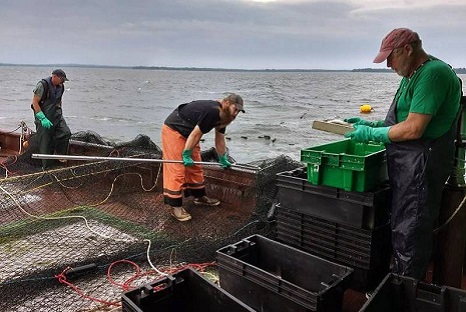
Commercial Fishing on the Great Lakes is a Family Affair
Although the number of fishermen who make a living on the waters of the Great Lakes is much diminished from a half century ago, the region’s commercial whitefish fishery continues to be viable and profitable. Henriksen Fisheries is one of about a dozen commercial entities in the Wisconsin waters of Lake Michigan, focused on trap netting whitefish in Green Bay and the waters surrounding the Door Peninsula. Charlie Henriksen started his family-owned fishing business in Door County in 1987. Originally from Illinois, the Henriksen family enjoyed vacations in Door County, and eventually bought a hotel on the peninsula and became year-round residents. Charlie was enticed into joining friends fishing on the water, and it eventually became his full-time vocation. In 1989 he purchased his first boat. Photos, >click to read< 18:55
EDITORIAL: Commercial fishing avoids being gaffed one more time
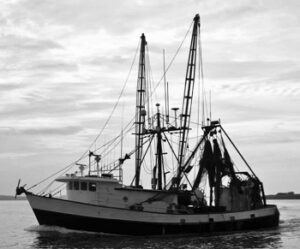 In August of 2020, almost three years before the date of the circuit court decision, a citizen’s lawsuit was filed against local shrimp trawl operators who regularly trawl for shrimp in Pamlico Sound. The plaintiffs argued that shrimp trawlers are violating the Clean Water Act by engaging in two type of unpermitted activity, “throwing bycatch (untargeted fish) overboard and disturbing sediment with their trawl net.” Named as defendants were local trawl owners who fortunately, with the help of outside support, were able to withstand the cost and time to defend themselves and by extension, the commercial fishing industry, during the three-year path of the lawsuit. >click to read< 08:15
In August of 2020, almost three years before the date of the circuit court decision, a citizen’s lawsuit was filed against local shrimp trawl operators who regularly trawl for shrimp in Pamlico Sound. The plaintiffs argued that shrimp trawlers are violating the Clean Water Act by engaging in two type of unpermitted activity, “throwing bycatch (untargeted fish) overboard and disturbing sediment with their trawl net.” Named as defendants were local trawl owners who fortunately, with the help of outside support, were able to withstand the cost and time to defend themselves and by extension, the commercial fishing industry, during the three-year path of the lawsuit. >click to read< 08:15
Abbott’s Harbour wharf blocked off without notice to fishermen
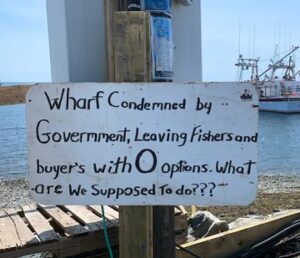 For Pubnico-area lobster fisherman Jaron d’Entremont, the Abbott’s Harbour wharf has been his home port since he began his fishing career six years ago. “One day I was there checking my boat and I saw inspectors there looking around checking underneath the wharf. A month later without any notice they put the blocks there and deemed it unsafe, “Fishermen are permitted to walk down on the Yarmouth County wharf to check their vessels, said d’Entremont, but vehicular traffic is prohibited. Diggdon noted the Abbott’s Harbour wharf is under DFO’s Small Craft Harbour program and is classified as a core fishing harbour meaning “it is deemed critical to the commercial fishing industry.” >click to read< 12:28
For Pubnico-area lobster fisherman Jaron d’Entremont, the Abbott’s Harbour wharf has been his home port since he began his fishing career six years ago. “One day I was there checking my boat and I saw inspectors there looking around checking underneath the wharf. A month later without any notice they put the blocks there and deemed it unsafe, “Fishermen are permitted to walk down on the Yarmouth County wharf to check their vessels, said d’Entremont, but vehicular traffic is prohibited. Diggdon noted the Abbott’s Harbour wharf is under DFO’s Small Craft Harbour program and is classified as a core fishing harbour meaning “it is deemed critical to the commercial fishing industry.” >click to read< 12:28
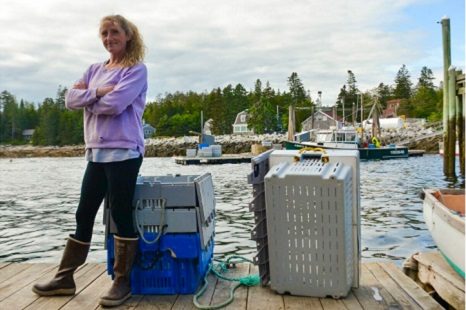
Meet the Women Making Waves in Maine’s Tough Lobster Industry
When Krista Tripp was 18, she’d completed all of the hours at sea necessary to get her captain’s license, but her parents submitted her brother’s paperwork to the State of Maine and not hers. Why? Even though Krista had been hauling traps since she was eight years old and running her own boat since 15, the expectation was that now she’d settle down and start having babies. “My brother and I shared the boat, we had 150 traps, and I became obsessed at an early age,” Tripp recalls. “I knew that was what I wanted to do. But, as a girl, my parents didn’t really take me seriously.” Tripp would spend the next few years working as a sternman off of a scallop boat in Massachusetts. Eventually, she returned to Maine, and after 14 years, she got herself off the waiting list and became the captain of her own lobster boat. Today, she has been captaining her own lobster boat for more than eight years. Photos, >click to read< 14:23
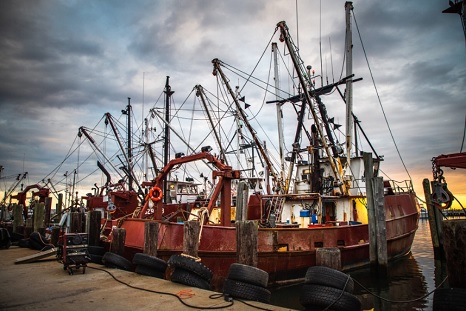
Viking Village Is A Uniquely Jersey Shore Experience
Viking Village seems like a place where time has stood still at the Jersey Shore and gives visitors a glimpse of what life was like during a time when fishing dominated the scene, long before tourism became the driving factor at the shore. The Viking Village, initially known as the Independent Fish Company, was founded as a lobster fishing co-op by first-generation Norwegian fishermen. As the lobster population began to decline, the fishermen adapted their gear and turned to sea bass fishing, which proved to be prosperous until the 1950s. Over the years, the fishing practices at the Viking Village evolved, incorporating scallop, gillnet, and longline fishing, which remain the backbone of its operations today. >click to read< 08:07
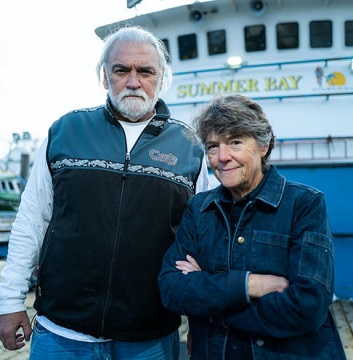
‘Deadliest Catch’ Star ‘Wild’ Bill Wichrowski Was Initially ‘Skeptical’ of the Show
The popular show reels viewers in with its unvarnished look at the rough-and-tumble world of commercial fishing. But not everyone who participates in the show was initially sold on the idea. Captain ‘Wild’ Bill Wichrowski has said that when he first heard about the series, he wasn’t eager to sign on. These days Wichrowski is a fixture on Deadliest Catch. But he actually wasn’t part of the show’s initial cast. He joined the series in season 6, which aired in 2010. The Great Recession had just happened, and the economic downturn prompted him to say yes to filming. Wichrowski, however, was a holdout. The idea of being on TV “just didn’t hold interest,” he said. Wichrowski said his reality TV fame helped him promote causes he was passionate about, such as the Wounded Warrior Project. photos, video >click to read< 14:51
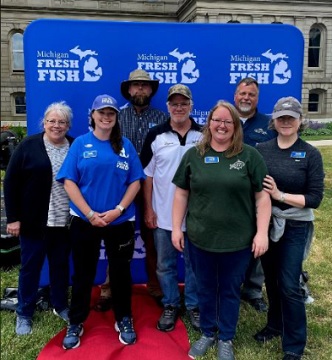
Bay Port Fish Company part of first Fresh Fish Expo in Lansing
Legislators and residents were gathered on the lawn of the capitol building in Lansing for the first Fresh Fish Expo, where the commercial fishing companies in Michigan provided education on the freshwater resource and were cooking up fish for those in attendance on June 13. The Bay Port Fish Company was present and brought over plenty of fish for the occasion. The company is one of eight commercial fishing license holders in the state. “A lot of people came that didn’t know about commercial fishing,” said Lakon Williams, co-owner of Bay Port Fish Company. “They were able to meet the people who provide the fish in the state and have conversations with them.” 9 photos, >click to read< 17:55
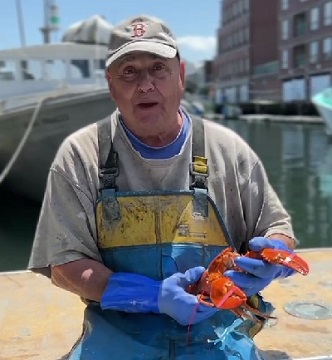
Lobsterman catches 3rd rare orange lobster in a week
A lobsterman working out of Portland caught his third rare orange lobster in a week on Thursday. Capt. Peter Pray showed up at Harbor Fish Market with another orange lobster, after catching two last Friday, according to CBS 13. Pray reportedly used the same trap he used to catch the first two. Pray caught the lobster using the same trap that he used to catch the first two. Photos, video, >click to read< 09:05
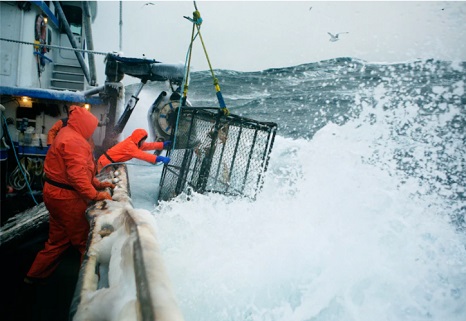
How Commercial Fisherman Corey Arnold Got Hooked On Fishing
Chris Arnold was an avocado grower and nurseryman, in Southern California, who bought a fishing boat when Corey was a toddler. He was reeling in baby sharks while still in diapers. “My dad was obviously busy with work and running a business, so fishing was a hobby for him,” says Arnold. “But I was 100 percent on fishing.” It was on a summer fishing trip to Alaska with his dad that Arnold first observed a commercial fishing operation — by 19, he had his first fishing job. He went on to work for seven years as a crab fisherman in Seattle, and eventually made his way to Alaska fishing for king crab on the F/V Rollo (featured on Season 2 of the Deadliest Catch) in the depths of winter, on the Bering Sea. Photos, >click to read< 11:15
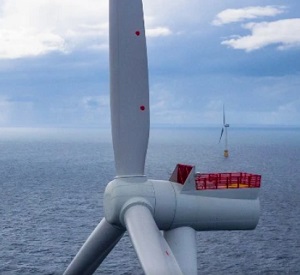
Blue Float Energy’s offshore wind farm opposed by Port Macdonnell community due to fishing, tourism concerns
A small coastal community in regional South Australia is ramping up its opposition to a proposed offshore wind farm off the state’s south-east coast. Renewable energy company Blue Float Energy has lodged plans for a 77-turbine wind farm off the coast of Port Macdonnell which would generate 1.1 gigawatts of clean energy. The proposal has already met resistance from Port Macdonnell residents where the local economy relies on commercial fishing and seaside tourism. Local fishers say the 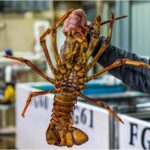 proposed area for the wind turbines, 8-20 kilometres offshore, is where many catch their lobster, with fears any exclusion zone placed around the turbines would make areas inaccessible. They are also concerned about any environmental impacts on lobster, despite no studies yet taking place. >click to read< 10:12
proposed area for the wind turbines, 8-20 kilometres offshore, is where many catch their lobster, with fears any exclusion zone placed around the turbines would make areas inaccessible. They are also concerned about any environmental impacts on lobster, despite no studies yet taking place. >click to read< 10:12
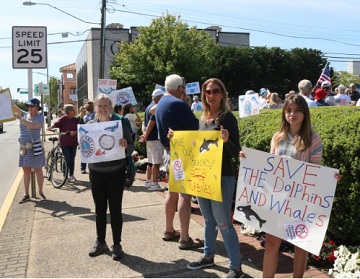
Wind Farm Protesters March in Ocean City
Opposition to the wind farm has been mounting following more than 30 whale deaths along the East Coast that critics have blamed on sonar mapping of the seabed that is needed for construction of the project. However, government agencies such as the National Oceanic and Atmospheric Administration and the New Jersey Department of Environmental Protection say the recent deaths of whales, dolphins and other marine creatures in New Jersey and other coastal states have nothing to do with the wind farm work. They say evidence shows that most of the whales were struck and killed by shipping traffic. Opponents reject those claims, though. During Saturday’s protest, speakers pointed the finger at the wind farm for the whale deaths and warned of other possible dire impacts that the project could have on the Jersey Shore’s environment, the tourism industry and commercial fishing operations. Photos, Video, >click to read< 07:55
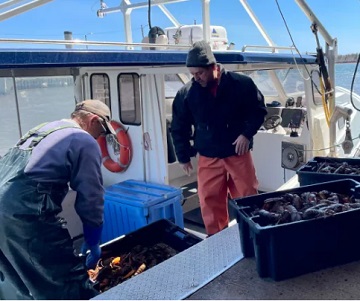
North Atlantic right whales causing ‘mess’ for P.E.I. lobster crews forced to move traps
Due to federal protocols, fishers had until Tuesday at 5 p.m. AT to move their gear out of waters deeper than 10 fathoms, about 18 metres, to protect the whales sighted late last week. The measure will last for 15 days, unless the whales are still in the area. Then the fishing area would be closed for at least another 15 days. “That’s not going to be good,” said Tony Clements, who fishes out of Northport. “We’re hoping for the best,” said David Henderson, who also moved 120 of his traps out of the closed zone. Out of 1,260 fishers, about 700 have already fully or partly converted to the whale-safe gear that will be mandatory by 2024. >click to read< 16:57
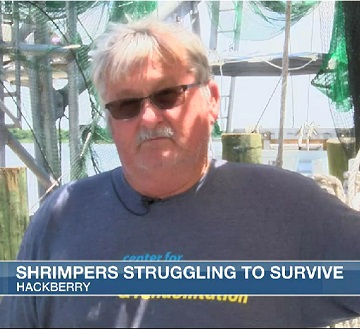
Shrimpers in Louisiana struggling to survive off low prices
Last week, shrimpers from across Louisiana held a rally at the State Capitol, blaming foreign imports for overcrowding the market. “You’re not breaking even right now, you’re in the red. Matter of fact, you’re below the red. I just don’t know what else to do,” Hackberry shrimper Kenny Kellum said. The abundance of foreign imported shrimp has caused prices to plummet in Louisiana, making it nearly impossible for shrimpers to survive. “We don’t want to give it up but we’re being forced out of something we’ve been doing all our lives and there’s no reason why somebody else should come in here and put us out of our living,” Kellum said. Video, >click to read< 16:34
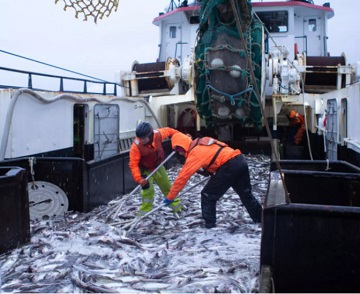
‘A’ season pollock quota back on par after decrease last season
Bering Sea pollock fishermen have almost met their “A” season quota. Since the fishery opened in late January, nearly 100 vessels have caught about 1.2 billion pounds of Alaska pollock. That leaves about 43 million pounds still available to catch. “It’s definitely a lot of fish,” said Krista Milani, a fisheries resources management specialist with the National Oceanic and Atmospheric Administration in Unalaska. “Sometimes when you think about the amount of pollock that they’re able to sustain in the Bering Sea, it’s kind of mind-blowing how much pollock is actually there.” According to NOAA, fishery managers were dealing with data gaps stemming from the COVID-19 pandemic. A population survey also came back lower than expected. “A” season ends June 10 — the same day “B” season starts. >click to read< 11:04
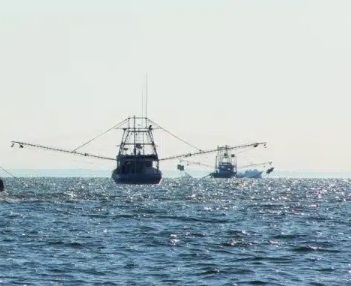
Shrimp season in Mississippi to open on May 22
The Mississippi Department of Marine Resources (MDMR) has set the opening date for the 2023-2024 shrimp season in state territorial waters for Monday, May 22 at 6 a.m. All regulations of the MDMR will be in full force and effect, and all boats engaged in catching and transporting shrimp from Mississippi waters must be licensed or permitted by the agency before beginning operations. Staff will continue to sample prior to the opening date. The shrimp season opening date may be postponed if sampling indicates movement of large numbers of juvenile brown shrimp into this area. >click to read< 13:04
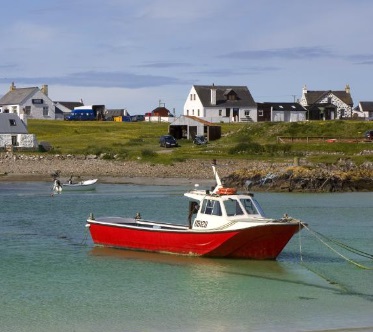
HPMAs: Tiree’s economy could sink unless plans are scrapped
In Tiree, there are good years and bad years. Years when crab and lobster are plentiful, years when they are not. Small boats work using fixed-line, static gear. Tiree fishermen place their creels with the precision afforded by sonar technology. There is no bycatch. Anything which will not be landed is thrown back alive. Many are voluntarily notching lobsters to ensure future stocks. Now, with the government’s proposals for statutory HPMAs, we are being told that our seas must be even more highly protected – from the people who live and work here. From us. >click to read< 10:01






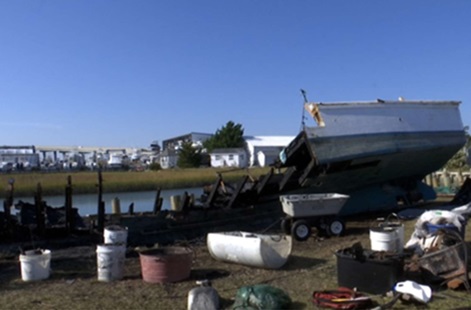
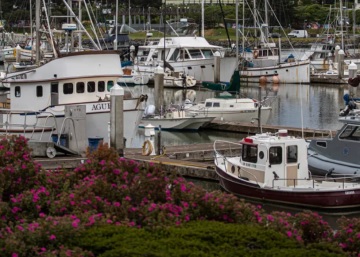
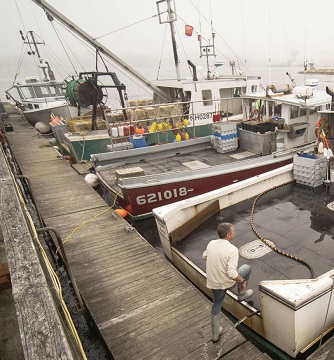
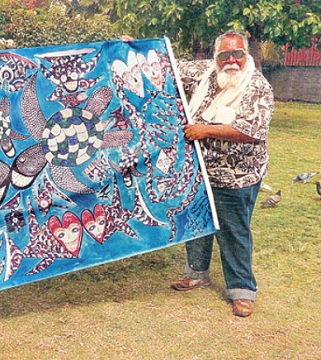
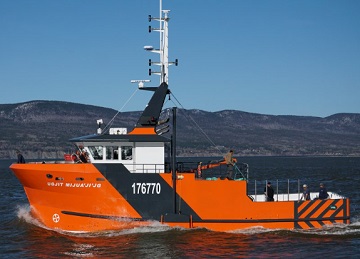



























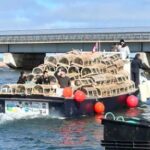

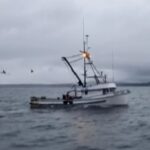
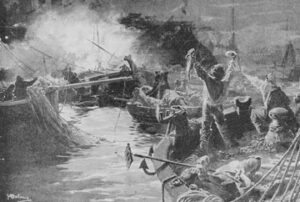
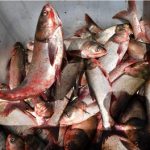
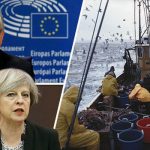
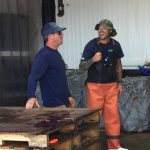
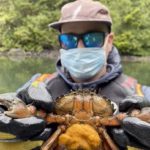
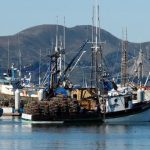

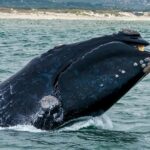



Stevenson: It’s time for public comments on offshore wind
Share this post